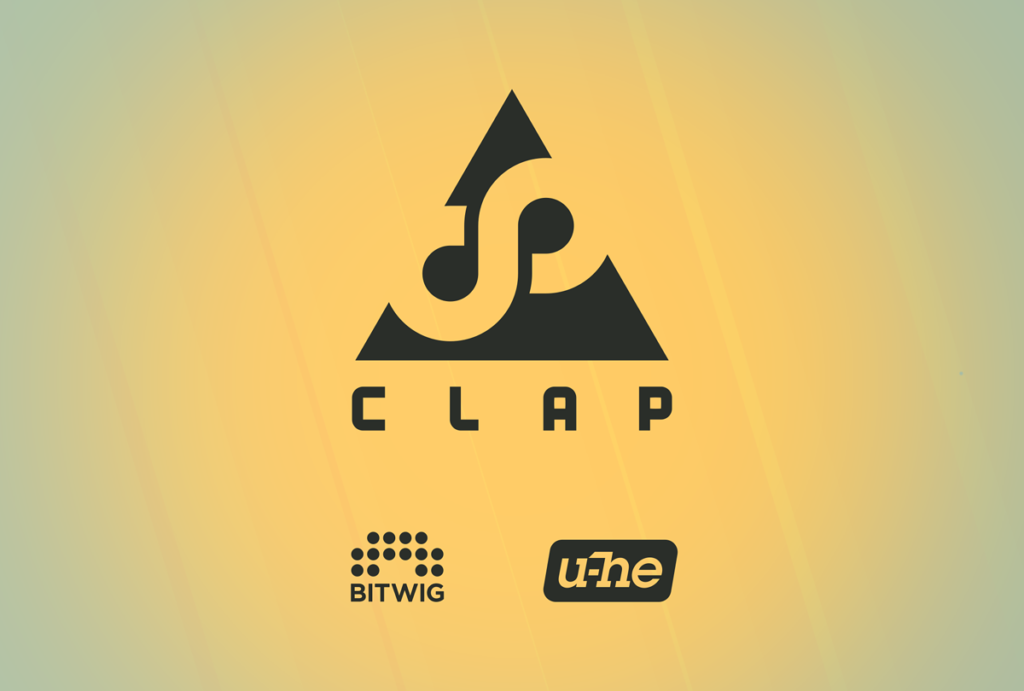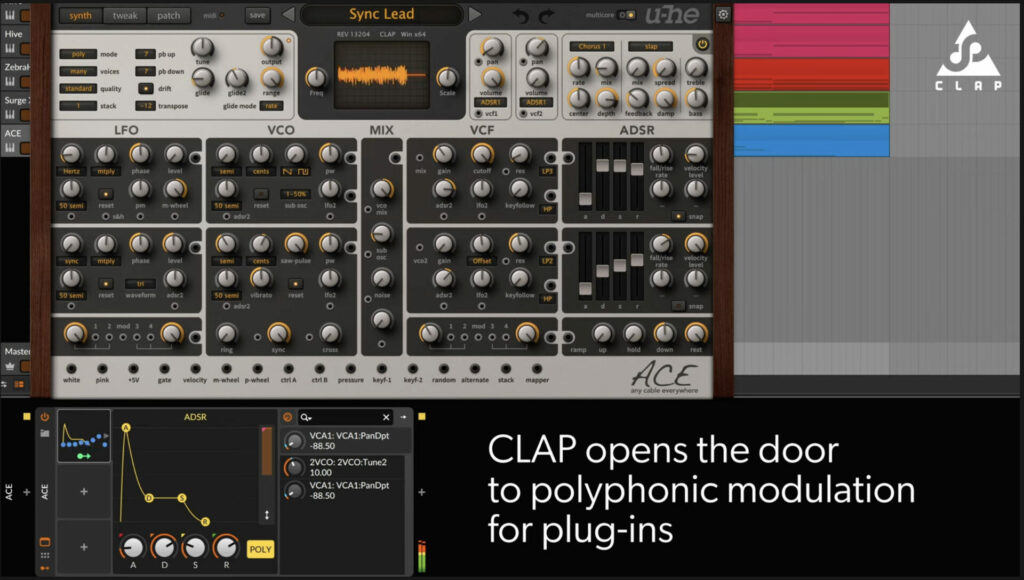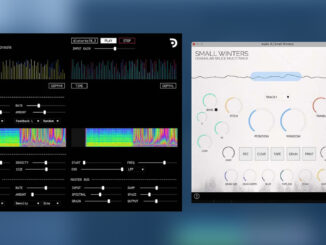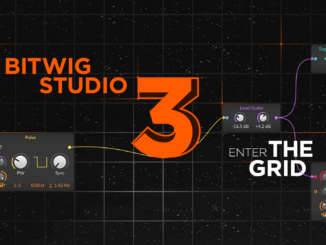CLAP by Bitwig & U-he is a new open standard for audio plugins & hosts promising better performances, new features, and no bureaucracy.
Musicians buy a plugin, download it, install it and work with it. We don’t notice anything about the work the developers have behind the scenes. In addition to long developments, and maintenance work, there are many bureaucratic hurdles if you want to develop plugins. Including signing contracts, etc.
Bitwig and U-he want to change that with the new free plugin format CLAP. According to the motto: bye-bye bureaucracy. At the same time, they address the weaknesses of the current formats and expand the new format massively in many places. The first betas are out now.
Bitwig U-he CLAP
CLAP (Clever Audio Plugin API) is a new open standard for audio plugins and hosts that promises modern features, better stability, and rapid support for plugin and host developers. Where today’s plugin formats such as VST, VST3, AU, or AAX are weak, CLAP cleans up and gives you more modern features.
For the development, the Berlin companies Bitwig and U-he have joined forces and worked closely with music producers. The result is an open standard that has advantages for musicians and developers alike.
The entire development is open-source under the MIT license. There are no entry hurdles for developers: no fees, memberships or proprietary license agreements are required before developing or distributing a CLAP-capable host or plug-in, and the license never expires.
Better Performance From Modern CPUs
The CPU is essential for a plugin to work. The more modern the CPU is the better and more efficient performance is. CLAP is tailored to modern CPUs and benefits from modern designs. According to the developers, CLAP takes multi-thread management to a new level, with a clear and efficient allocation of roles between plug-in and host.
Specifically, CLAP allows collaborative multicore support between plug-in and host through a so-called “thread-pool”, also allowing hosts to manage CPU-threading for plug-ins that provide their own multicore support. Preliminary tests show significant performance gains compared with current solutions. Less CPU consumption is always very desirable
Better + Faster Organization
If you use many plugins, loading a DAW can take a little longer. Especially when installing a new DAW. CLAP also brings improvements here. CLAP-ready hosts are capable to read plugin metadata and help organize your plugins. As CLAP hosts can retrieve information from plug-ins without having to wait for them to initialize, plug-in scans can be much faster.
There will also be soon an extension that allows plugins to communicate to the hosts which files they need (samples, wavetables…). The host then can consolidate those in the project file. That means you’ll never lose a sample while transferring a project between systems.
Better Modulation
Plugins are important tools for musicians to creatively capture their ideas. No matter if synthesizer, effect… and CLAP will also open new ways to create music. The new open standard will expand the modulation capabilities.
First, it supports per-note automation and modulation (MIDI 2.0 specification). Secondly, it introduces a new parameter modulation concept that allows for temporary parameter offsets. Parameter modulation is non-destructive, so as soon as the modulation has finished, the target parameter will return to its original state.
And CLAP makes it possible for polyphonic plugins to have their per-voice parameters modulated for individual notes (“MPE on steroids”). That sounds super exciting and I hope the developers follow the aim of this format and add new inspiring features to their products.
MIDI
Inspired by MPE and MIDI 2.0, CLAP can adapt to any future MIDI standard. Wherever a solid standard exists, we allow developers to freely decide how to apply it. Plug-ins can receive and send any MIDI event on multiple ports.
For Developers
CLAP brings innovations not only for musicians, i.e. users, but also for developers:
The KISS (keep it simple, silly) mantra belongs to CLAP. From the C-only ABI, which allows binding to any programming language, to the transparent client-server model between host and plug-in, the robustness and clarity of the threading model, and the single event queue for all kinds of parameter changes, timing and MIDI. Despite being so comprehensive, everything in CLAP is easy to find and easy to implement.
A single cpp/hpp glue layer for C++ offers a quick start into the ABI, and its built-in “proxy layer” finds common threading bugs in an instant. Apropos C-only ABI: There are no platform specific dependencies: In theory CLAP should also run well on embedded platforms, game consoles or specialized supercomputers.
Extensibility & Governance
A simple system for extensions makes CLAP future-proof. Companies can offer proprietary extensions if required for specific features.
CLAP 1.0 is the result of a multi-year project initiated by u-he and Bitwig, with design and implementation contributions by a group of commercial and open source audio developers from across our industry. As we proceed beyond the initial set of extensions, we are committed to establishing a transparent process to govern the standard which allows participation from the entire audio software community. We welcome participation from the development community today, and we will share details of these processes and governing models over the second half of 2022.
CLAP does not only exist on paper; there are several ways you can try it out now. See the links below for projects from u-he, Bitwig, and others. Several other industry players are currently evaluating the CLAP standard.
Following companies and projects are already evaluating CLAP for their host and plug-in software:
- Arturia
- Avid
- BespokeSynth
- CableGuys
- Cockos
- Cytomic
- DMGAudio
- Epic Games (Unreal Engine)
- Expressive E
- FabFilter
- Image-Line
- iPlug2 framework
- LHI Audio
- Node Audio (Etonal Studio)
- Oddsound
- Presonus
- ValhallaDSP
- VCV
- Vital Audio
- Xfer Records
- …
First Impression
Three major companies are currently in charge of the plugin world: Steinberg, Apple, and Avid. In that sense, you are dependent on them, regardless of whether you are a musician or a developer. A dependency always has disadvantages, mainly because you are always dependent on the available features and on whether the publisher continues the format or not.
Because CLAP is open-source, this disappears. It will be there forever, regardless of whether the manufacturers are still around 10 or 20 years from now. That’s very positive. I also really like that they try to eliminate the actual limitations of VST, AU, and AAX and bring working with plugins further. A super exciting project especially to see who will be offering CLAP in the future.
CLAP is now available in the latest Bitwig Studio beta version and in the u-he CLAP beta version of ACE, Diva, Hive 2, and MFM2.5. You can also find it in the Chowdhury DSP plugins, MultitrackStudio DAW, and the Surge XT Synthesizer plugin. Plugs in TheWaveWarden Odin 2, Dexed, and more.
For the latest updates, example code, and information check CLAP’s Github page.






Bitwig and U-he making a plugin format – collab of the century!
Standards are fascinating. One might claim that we didn’t need a new standard. Yet, what this collaboration demonstrates is that existing standards aren’t sufficient to solve the problems we face, regardless of their technical merits.
Maybe CLAP won’t succeed where VST3 has failed. It’s still important to try.